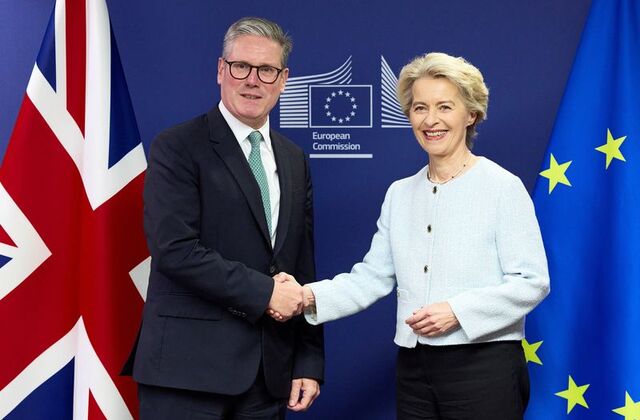Diplomatic sources say EU member states may demand guarantees for fishermen before discussing closer economic and security ties with the UK, Euronews reports.
British Prime Minister Keir Starmer is travelling to Brussels on Monday, once again showing a willingness to overcome the differences that have accumulated in recent times.
The informal European Council summit he will attend will be the first time the British leader will join all 27 EU leaders since Britain left the bloc five years ago. Starmer is also due to meet NATO Secretary General Mark Rutte.
An EU diplomat said Monday’s talks are expected to focus on the “broad political objectives” of the “reset” in EU-UK relations that the Labour prime minister has promised.
Starmer’s government, elected last July after 14 years in opposition, has said it intends to strengthen co-operation with the EU, while its specific plans for closer co-operation remain unclear.
Security as the main issue
Security is expected to be the main topic of the talks. Starmer reportedly intends to call on Britain’s closest allies to “step up their efforts and shoulder a greater share of the burden of securing Europe.”
The talks will also touch on defence, migration, energy security and critical raw materials.
EU officials have welcomed London’s attempts at rapprochement, but there are signs that member states will assert their interests in future bilateral talks, which are expected to begin after an EU-UK summit scheduled for the spring.
An EU diplomat, who spoke on condition of anonymity, suggested that at least two of the bloc’s countries would seek fishing licences as a precondition for any agreement.
A veterinary agreement that would lower barriers to trade, a youth mobility agreement, energy co-operation and fishing licences are among the issues to be discussed in Brussels, the diplomat said.
“Of course there is an interlink between all of them because at the end of the day that relationship is a package,” the diplomat added. “There is no beating around the bush, fisheries is also very important. There is no direct trade-off between one or the other but the Commission will have to keep a parallel between these different buckets.”
Trade and Co-operation Agreement
The Brexit deal, known as the Trade and Co-operation Agreement (TCA), provides reciprocal access for fishing vessels to both sides’ territorial waters until June 2026. Fishing licences after that date have yet to be negotiated.
The EU is challenging in court the UK government’s recent ban on sand eel fishing in the North Sea, arguing that London’s decision unfairly discriminates against Danish fishermen. This is the first arbitration case under Britain’s withdrawal agreement from the EU and highlights the symbolic importance of fishing in the dispute between London and Brussels, despite it being a small part of each side’s economy.
Deal for UK-EU youth
The Youth Mobility Scheme, which the EU executive proposed last April, is also a key EU demand. The agreement would have made it easier for 18-30-year-old Britons and Europeans to cross the UK-EU border to study, work and live, and would have paved the way for the UK to re-join the Erasmus programme.
However, Labour has rejected the idea in the past, believing it to be too close to a return to freedom of movement, which is still disliked by the majority of British voters. Nevertheless, the Labour-led cabinet is believed to be considering a deal to ease administrative requirements for artists touring in the EU and the UK and mutual recognition of professional qualifications.
Speaking to Euronews, political analyst Peter Kellner said the UK’s defence and security advantage – as a nuclear power and possessor of modern armed forces – could give it bonuses in seeking better access to the EU market.
“I would imagine defence and security to be the cards the UK could play to get the EU to engage in a more serious discussion about closer trade,” Kellner said.
The possibility that US President Donald Trump could raise trade tariffs, targeting Europe, and weaken Washington’s support for Ukraine could also force both sides to speed up talks and put their differences aside.
Trump’s pivot to Asia and aggressive trade protectionism policies threaten London’s Global Britain strategy and could force the United Kingdom to urgently step up efforts to strengthen trade ties with the EU.
“The UK wants both Washington and Brussels on its side,” Kellner explained. “But there also may well be future issues, such as Trump’s threats to seize Greenland, where the UK is forced to take sides.”
